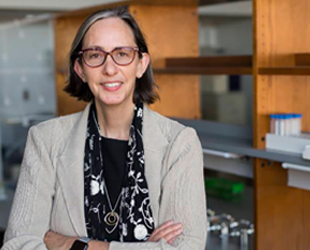NCI Director Shares Impact of AACR Grants on Her Research and Career
W. Kimryn Rathmell, MD, PhD, formerly of Vanderbilt University Medical Center, was appointed by President Biden in 2023 as 17th Director of the National Cancer Institute (NCI). A world-renowned physician-scientist in the field of renal cell carcinoma (RCC), Dr. Rathmell shares the impact on her career and her research of two AACR-supported research grants that she received while at Vanderbilt, the 2018 AACR-Kure It Research Grant for Immunotherapy in Kidney Cancer and 2010 Landon Foundation-AACR INNOVATOR Award for Research in Personalized Cancer Medicine.

June 17 is World Kidney Cancer Day. What has inspired you to pursue renal cell carcinoma as your research focus?
I became interested in RCC because it has such a unique biology and at the time I was starting out, had no effective therapies. It seemed like the perfect place for biology to lead the way in developing therapies that worked, and that really delivered. Also, it’s a good mix of patients who are individually wonderful, and the various types of kidney cancers, that have kept me fascinated. Cancer biology in general, and RCC in particular, has been moving at a rapid pace, so there was always a lot of new material to digest and to fold into the evolution of the field.
What has been the impact of AACR-supported grants on your career, and what does it mean, for you, to receive these grants?
Support from AACR has given us the flexibility to delve into an area of research that was newer for our group and was more high risk, but high reward. Awards like these demonstrate that the field recognizes the need for innovation in continuing to make breakthroughs that advance the lives of patients with cancer.
Now more than half of my lab works on the tumor microenvironment. I have made new collaborations and together we are applying our next grants on immune cell communication and metabolic signaling. For example, although Jeff Rathmell and I have been married for over 30 years, we really didn’t collaborate until this grant. Now it is natural, and it’s coming at a great time for us as cancer biology pivots to immunology. New lab members, such as Dr. Dakim Gaines, MD, PhD, have been drawn in to work on this topic.
Especially as I move further into administration, while I’m proud of the work I do as an academic leader, it remains important to have that validation that at my core, I’m a cancer researcher.
What do you consider the most important scientific advance(s) made, at least in part, because of your AACR-supported grants?
The investment has paid off with new paradigms of metabolic signaling. The major advances include the concept that nutrients are not limiting in the tumor microenvironment and that competition for nutrients is not a major determinant of cell fates. The selection of nutrient utilization is programmed by cell type and can be modified pharmacologically. This has impact for interpreting common PET scans, and developing new imaging PET scans, as well as for treatments that take advantage of the metabolic differences. We hope our work will further personalize this feature of tumors, to understand how metabolites and nutrients can be used to shift the balance for selected tumors.
How have these grants allowed you to pursue research that would not have been otherwise possible?
Our funding was entirely focused on tumor genomics, and that was what we were known for. Although we were starting to get into the microenvironment in a collaborative way, we could not get major grants to do this work without establishing a better track record, which we now have — thanks to the AACR grant. This also supported two students to dive into this work, and that paves the way for personnel to identify my lab as one where we work on the tumor microenvironment and metastasis—and we recruited a new postdoc because our lab now has a different focus and feel.
In what ways, if any, has the COVID-19 pandemic impacted your research? What is your advice to fellow researchers to mitigate these effects?
The pandemic has slowed down work as we worked in socially distant ways. Being separated and having lab meetings virtually has slowed down communications. Decisions these days may take days or weeks when they could be done in minutes in pre-pandemic times. We have seen other grant mechanisms hold back on funding, and NIH funding is tighter. We, like other labs, have also been affected by supply chain issues so that we can’t do experiments due to backorders and delays in receiving essential supplies.
My advice is to strive to find new patterns of work that can accommodate the evolving guidance, and to keep morale up with as much interaction as possible. We have worked hard to write papers and grants when we were prevented from doing experiments. We continually try to find silver linings and to recognize the pieces of the pandemic that we want to retain when life is back to normal (like virtual lab meeting and strategies that reduce plastic ware use).
Since 1993, the AACR grants program has contributed to the development of new and improved approaches to cancer treatment and cure. What is your vision for the future of renal cell carcinoma research?
I may be biased, but I think RCC will see a surge in new therapeutics that are targeting elements of the microenvironment: drugs that enhance the immune cells, but also drugs that shift the suppressive cell components and alter the environment in a way that is inhospitable to the cancer cell survival. With immunotherapy as an anchor, the next generation will take that to the next level.